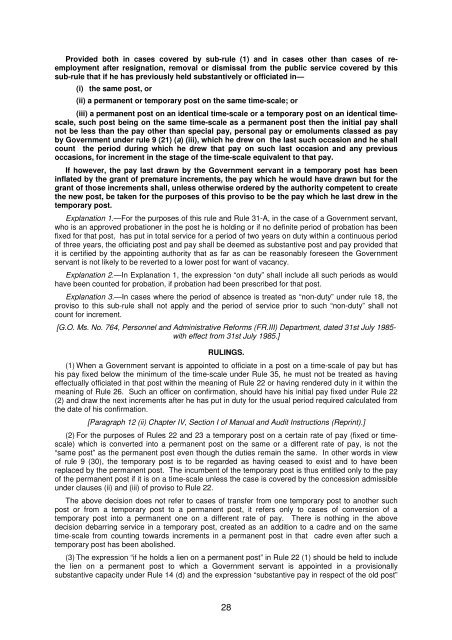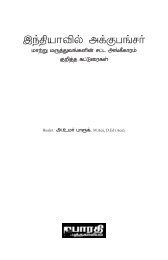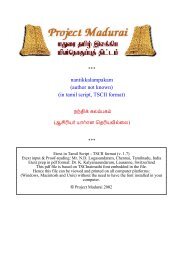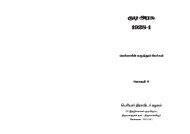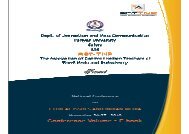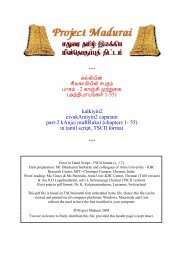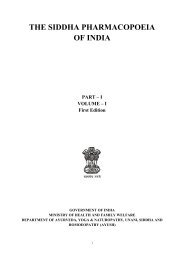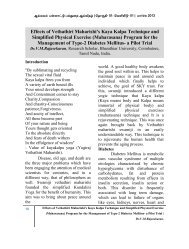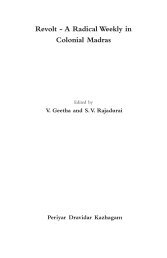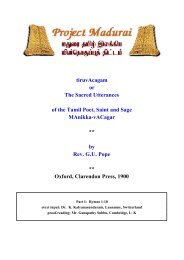THE FUNDAMENTAL RULES OF THE TAMIL NADU GOVERNMENT
THE FUNDAMENTAL RULES OF THE TAMIL NADU GOVERNMENT
THE FUNDAMENTAL RULES OF THE TAMIL NADU GOVERNMENT
- No tags were found...
Create successful ePaper yourself
Turn your PDF publications into a flip-book with our unique Google optimized e-Paper software.
Provided both in cases covered by sub-rule (1) and in cases other than cases of reemploymentafter resignation, removal or dismissal from the public service covered by thissub-rule that if he has previously held substantively or officiated in—(i) the same post, or(ii) a permanent or temporary post on the same time-scale; or(iii) a permanent post on an identical time-scale or a temporary post on an identical timescale,such post being on the same time-scale as a permanent post then the initial pay shallnot be less than the pay other than special pay, personal pay or emoluments classed as payby Government under rule 9 (21) (a) (iii), which he drew on the last such occasion and he shallcount the period during which he drew that pay on such last occasion and any previousoccasions, for increment in the stage of the time-scale equivalent to that pay.If however, the pay last drawn by the Government servant in a temporary post has beeninflated by the grant of premature increments, the pay which he would have drawn but for thegrant of those increments shall, unless otherwise ordered by the authority competent to createthe new post, be taken for the purposes of this proviso to be the pay which he last drew in thetemporary post.Explanation 1.—For the purposes of this rule and Rule 31-A, in the case of a Government servant,who is an approved probationer in the post he is holding or if no definite period of probation has beenfixed for that post, has put in total service for a period of two years on duty within a continuous periodof three years, the officiating post and pay shall be deemed as substantive post and pay provided thatit is certified by the appointing authority that as far as can be reasonably foreseen the Governmentservant is not likely to be reverted to a lower post for want of vacancy.Explanation 2.—In Explanation 1, the expression “on duty” shall include all such periods as wouldhave been counted for probation, if probation had been prescribed for that post.Explanation 3.—In cases where the period of absence is treated as “non-duty” under rule 18, theproviso to this sub-rule shall not apply and the period of service prior to such “non-duty” shall notcount for increment.[G.O. Ms. No. 764, Personnel and Administrative Reforms (FR.III) Department, dated 31st July 1985-with effect from 31st July 1985.]RULINGS.(1) When a Government servant is appointed to officiate in a post on a time-scale of pay but hashis pay fixed below the minimum of the time-scale under Rule 35, he must not be treated as havingeffectually officiated in that post within the meaning of Rule 22 or having rendered duty in it within themeaning of Rule 26. Such an officer on confirmation, should have his initial pay fixed under Rule 22(2) and draw the next increments after he has put in duty for the usual period required calculated fromthe date of his confirmation.[Paragraph 12 (ii) Chapter IV, Section I of Manual and Audit Instructions (Reprint).](2) For the purposes of Rules 22 and 23 a temporary post on a certain rate of pay (fixed or timescale)which is converted into a permanent post on the same or a different rate of pay, is not the“same post” as the permanent post even though the duties remain the same. In other words in viewof rule 9 (30), the temporary post is to be regarded as having ceased to exist and to have beenreplaced by the permanent post. The incumbent of the temporary post is thus entitled only to the payof the permanent post if it is on a time-scale unless the case is covered by the concession admissibleunder clauses (ii) and (iii) of proviso to Rule 22.The above decision does not refer to cases of transfer from one temporary post to another suchpost or from a temporary post to a permanent post, it refers only to cases of conversion of atemporary post into a permanent one on a different rate of pay. There is nothing in the abovedecision debarring service in a temporary post, created as an addition to a cadre and on the sametime-scale from counting towards increments in a permanent post in that cadre even after such atemporary post has been abolished.(3) The expression “if he holds a lien on a permanent post” in Rule 22 (1) should be held to includethe lien on a permanent post to which a Government servant is appointed in a provisionallysubstantive capacity under Rule 14 (d) and the expression “substantive pay in respect of the old post”28


